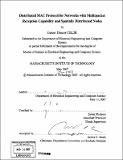Distributed MAC protocol for networks with multipacket reception capability and spatially distributed nodes
Author(s)
Celik, Guner Dincer
DownloadFull printable version (5.820Mb)
Other Contributors
Massachusetts Institute of Technology. Dept. of Electrical Engineering and Computer Science.
Advisor
Eytan Modiano.
Terms of use
Metadata
Show full item recordAbstract
The physical layer of future wireless networks will be based on novel radio technologies such as Ultra-Wideband (UWB) and Multiple-Input Multiple-Output (MIMO). One of the important capabilities of such technologies is the ability to capture a few packets simultaneously. This capability has the potential to improve the performance of the MAC layer. However, we show that in networks with spatially distributed nodes, reusing MAC protocols originally designed for narrow-band systems (e.g., CSMA/CA) is inefficient. It is well known that when networks with spatially distributed nodes operate with such MAC protocols, the channel may be captured by nodes that are near the destination. We show that when the physical layer enables multi-packet reception, the negative implications of reusing the legacy protocols include not only such unfairness but also a significant throughput reduction. We present a number of simple alternative backoff mechanisms that attempt to overcome the throughput reduction phenomenon. We evaluate the performance of these mechanisms via exact analysis, approximations, and simulation, thereby demonstrating that they usually outperform the legacy backoff mechanisms. We then discuss the implications of the results on developing realistic MAC protocols for networks with a multi-packet reception capability and in particular for UWB networks.
Description
Thesis (S.M.)--Massachusetts Institute of Technology, Dept. of Electrical Engineering and Computer Science, 2007. Includes bibliographical references (p. 123-127).
Date issued
2007Department
Massachusetts Institute of Technology. Department of Electrical Engineering and Computer SciencePublisher
Massachusetts Institute of Technology
Keywords
Electrical Engineering and Computer Science.